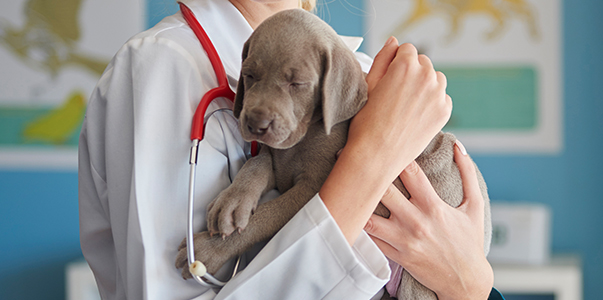What is parvovirus?

Parvovirus (often referred to as parvo) is a virus that attacks the gut. For puppies, at such a crucial stage of their development, before they have had their vaccinations and when their immune system is still developing, it can also affect their bone marrow, cell development and heart. Parvovirus is highly contagious in unvaccinated puppies and dogs and can be deadly if left untreated.
How do puppies and dogs become infected with parvo?
Parvo is transmitted rapidly via the faeces or vomit of infected puppies and dogs. The virus is stubborn and can live outside the body, on surfaces, the grass and anything at all that has come into contact with it. Humans can also unwittingly spread the virus by touching an infected puppy and moving on to play with others. If your dog’s vaccinations are up to date, he or she is at significantly lower risk of catching parvo.
What are the symptoms of parvovirus?
Trust your gut instinct in terms of whether you feel your dog is alert, happy and healthy.
It can take between three and ten days for a dog to show symptoms after having been infected. Symptoms include:
• Fatigue
• An unwillingness to eat or drink
• Vomiting
• Diarrhea
• High body temperature
What is the treatment for parvovirus?
Treatment for canine parvovirus is about supporting the puppy or dog so that their body can fight off the virus themselves. The most dangerous aspect of the infection is the loss of fluids and severe dehydration caused by vomiting, diarrhea and loss of appetite. This dehydration is life-threatening. Treatment therefore focuses on keeping the puppy or dog hydrated (through a drip) with medication to stop the vomiting and diarrhea.
For treatment to be effective, it needs to happen fast. Without treatment, it’s highly unlikely a puppy or dog will survive more than 48 to 72 hours
How long does it take for a dog to recover?
If your dog can survive the first few days of parvo on good treatment, it’s likely they'll return to good health within a week or so. The good news is that any long-term health issues as a result of a parvo infection are not common at all.
Did you know: a recovered dog continues to be infectious for up to 6 weeks
Whilst a recovered puppy or dog will be immune to the virus for several years, they will continue to be infectious to other dogs for approximately six weeks. This means that any puppy or dog who has had parvo must be kept away from public areas and unfortunately won’t be able to attend any training classes or daycare for at least 6 weeks. The key thing to remember is that any puppy or dog who is not vaccinated against parvo is at risk.
How can parvo be prevented?
All puppies and dogs should be vaccinated against parvo (it’s one of the routine vaccinations given to puppies in three shots at around 6 to 8 weeks of age, then again at 10 to 12 weeks and the final dose at about 14 to 16 weeks). If you keep your dog’s vaccines up to date with boosters when required, as recommended by your vet, they should have sufficient protection against parvo.
We hope this article has provided some useful information. If you are worried about your dog, the best advice is to get to a Vet as soon as possible.
And remember, we are also here to help so visit your local Absolute Pets store or get in touch with us online, or on Facebook.
Happy & Healthy
Absolute Pets